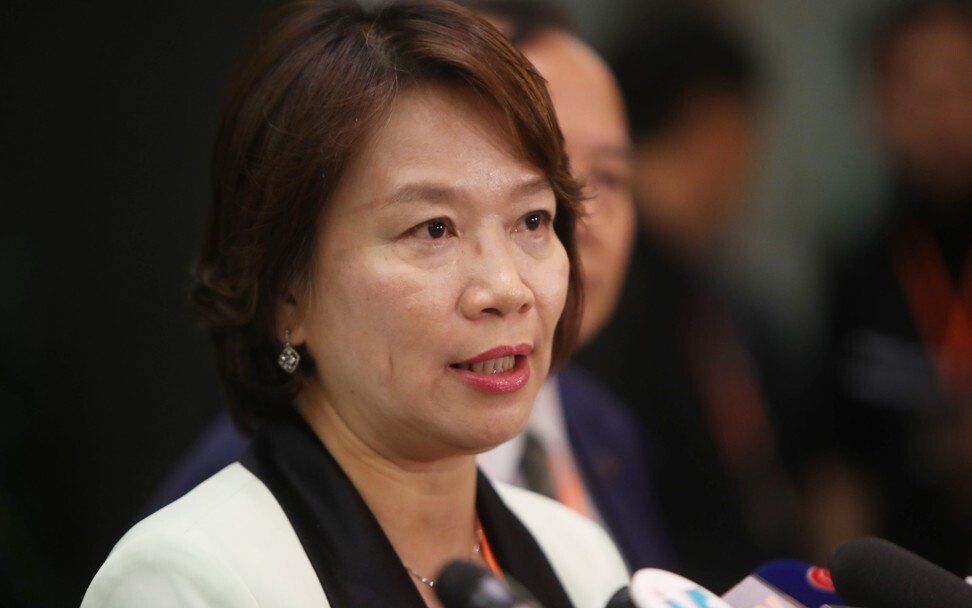Education Bureau call for submissions from private sector groups interested in establishing, near Hong Kong Wetland Park, a school running the mainland curriculum.
Officials have earmarked a site near Hong Kong Wetland Park to host the city’s first school dedicated to offering a mainland Chinese curriculum, which is designed to serve the families of migrant business professionals.
The Education Bureau revealed on Thursday it was inviting submissions from private sector organisations interested in establishing a non-profit school specifically for mainland-style learning, with officers saying the plan would help retain talent in the city, though others voiced concerns about its potential impact on competition within the sector.
A bureau spokesman said there were more than 50 international schools providing non-local curricula in Hong Kong, playing an important role in attracting workers and investment to the city.
“Notwithstanding our close ties with the mainland, there is still no primary or secondary school offering the mainland curriculum in Hong Kong,” the spokesman said.
“It is difficult for these children of mainland families who have studied in Hong Kong for a few years to reintegrate into the mainland education system when they choose to continue their studies on the mainland.”
Demand for Hong Kong schools offering a mainland curriculum is expected to rise given the vibrant development of the Greater Bay Area, as well as the city’s efforts in promoting the exchange of talent with the mainland, according to the spokesman. The bay area is an economic development zone covering Hong Kong, Macau and nine Guangdong cities.
The site adjoining the wetland park in Tin Shui Wai covers an area of 8,600 square metres (93,000 sq ft).
The new school will offer no fewer than 900 places and is expected to launch around the 2025-26 school year, according to the bureau.
A survey last November by the think tank China Silk Road iValley Research Institute found that more than 90 per cent of the 3,650 “Hong Kong drifters” polled expressed a desire to send their children to a local school that ran the mainland curriculum.
Hong Kong drifters is a term used to describe young and educated mainlanders staying in Hong Kong for work. Some studied in Hong Kong but have not yet lived here long enough to become permanent residents.
Witman Hung Wai-man, a researcher at the think tank, said the government plan was a good start towards “addressing the needs of Hong Kong-based mainland families”.
“It is hoped that more mainland curriculum schools can be built in the future,” said Hung, also a local deputy to China’s legislature, the National People’s Congress.
“These families can afford to pay and so school fees should not be a very big problem. There are some elite secondary schools on the mainland, like the Affiliated High School of Peking University.
“If they come to set up a branch in Hong Kong, it can also attract more Hong Kong students to take the mainland curriculum.”
 Legislator Priscilla Leung.
Legislator Priscilla Leung.
Pro-establishment legislator Priscilla Leung Mei-fun, chairwoman of the Legislative Council’s education panel, also said: “The market has changed ... The international environment and the city have changed so much in the last two years that mainland Chinese families in Hong Kong now believe it is better to send their children to the Peking and Tsinghua universities in Beijing.”
Michael Hui Wah-kit, chairman of Hong Kong’s small and medium enterprises committee, said while Hong Kong universities remained appealing to some mainland families in the city, the new school could make the city more attractive to those with younger children.
“If those children were already at primary or secondary school on the mainland, it would be very hard for them to adapt to the curriculum in a Hong Kong or international school,” he said.
Ruth Benny, founder of the education consultancy Top Schools, suggested the new mainland providers could lure some families away from international schools, but predicted the impact on the latter would be limited.
Only 2 per cent of the 18,000 pupils at Hong Kong’s biggest international school group, the English Schools Foundation, reported holding a Chinese passport in the 2019-20 academic year, although it was unclear how many others from the mainland carried an overseas passport.
A local subsidised secondary school principal said she hoped the Education Bureau would provide more details on how the new school would operate, such as whether pupils would take the gaokao, also known as the National College Entrance Examination.
The principal also sought information on the eligibility requirements for pupils and if the new school would have an impact on student enrolment at local and private competitors.
Wong Kam-leung, chairman of the pro-establishment Hong Kong Federation of Education Workers, welcomed the bureau’s plans.
“When there are international schools with different countries’ backgrounds in Hong Kong, why can’t there be a school with a mainland curriculum?” he said.















